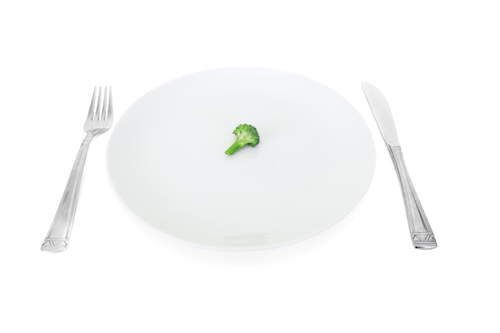If you want to lose weight, just don’t eat…It’s a logical thought, right? Unfortunately, the evidence to support this popular form of restrictive eating isn’t so cut and dried. Take a minute to check out these “fast facts” before you try fasting diets in the name of weight loss.
A Brief History…
Fasting, the practice of abstaining from all or some forms of food and drink for a period of time, is not a new phenomenon. Individuals have been fasting for centuries – it’s a common ritual in various religions and has even been used as a form of nonviolent protest by activists like Gandhi. Only in recent years has the concept of a strategic fasting diet become a topic of interest for those looking to improve health, lose weight and live longer.
Intermittent Fasting: The Various Approaches
While it sounds complicated, intermittent fasting is simply a method of dispersing times of starvation into a cycle of regular eating habits. There is certainly variation in how individuals apply the principles of fasting. Some institute an alternate-day fasting diet, which involves significant calorie restriction every other day. Others choose time-restricted feedings and opt to limit all of their day’s calories to a small, specific window of time – the idea being that more time is spent fasting than eating. The release of Dr. Michael Mosley’s book, “The Fast Diet,” back in 2013 sparked worldwide interest in yet another form of strategic starvation – the 5:2 diet.
Dr. Mosley summarizes the 5:2 system by stating that those embarking on the journey simply need to institute five days of normal eating, “with little thought to calorie control,” and two days of restrictive caloric intake (around 500 or 600 calories total). The theory behind the fasting diet is that you will achieve your total caloric quotient for the week by cutting back on the food you eat for only two days of the week rather than following a continuous, calorie-restricted diet.
 Proponents of the 5:2 regimen tout improvements in blood pressure, cholesterol and insulin sensitivity as the primary victory after following such a plan, with weight loss being a secondary, advantageous result.
Proponents of the 5:2 regimen tout improvements in blood pressure, cholesterol and insulin sensitivity as the primary victory after following such a plan, with weight loss being a secondary, advantageous result.
What Does Science Say About Fasting Diets?
Researchers have set out to evaluate whether or not occasional fasting may be equally or more beneficial than continuous (daily) energy restriction for the purposes of weight loss and improved health. A 2011 study evaluated 107 premenopausal women, all classified as overweight or obese; at least half of them had a family history of breast cancer.
Participants were randomly assigned either a low-calorie diet for seven days/week (25 percent fewer calories than their estimated needs) or an intermittent fasting diet, which permitted them to consume a normal diet five days/week (providing 25 percent fewer calories than their estimated needs) cycled with two days of a very low-calorie diet (75 percent fewer calories than their estimated needs).
The results? Participants in both groups were equally successful with achieving weight loss and improved markers of overall health (i.e., blood pressure, cholesterol, cancer risk markers). Improvements in insulin resistance were modestly more impressive in the intermittent fasting group than the traditional, calorie-restricted group.
Additional studies carried out in mice have indicated that fasting may have promising effects on longevity and overall health. But more research is certainly needed, particularly in human subjects, to better discern efficacy.
What Does This Mean for Lifestyle Changers?
As is the case with many mainstream alternative dieting approaches, the scientific and medical communities still do not have sufficient evidence to unite on a recommendation in support of fasting for weight loss, disease management or improved health.
If you have contemplated trying out fasting diets, there are a few things you should consider first:
- Fasting is not appropriate for pregnant women, diabetic patients or those who are taking certain medications, to name a few – No matter what your health history, it’s important that you talk with your doctor or other health care provider first before considering such a restrictive eating pattern.
- Side effects of extreme calorie restriction vary by individual but may include hypoglycemia (low blood sugar), headache, dizziness, constipation and/or heart palpitations; the risk of dehydration may also be greater.
- Fasting is HARD, and compensatory “cheat meals” (like eating a whole pizza) on non-fasting days can be an unfortunate side effect; this is counterproductive.
- It is important to consider the makeup of all meals consumed when you do eat to ensure vitamins, minerals and macronutrients like protein, carbohydrate and fat are not sacrificed along the way – registered dietitians are savvy at helping you determine your individual needs.
- The reduced calorie intake, particularly on very low calorie days, can reduce energy levels and make it harder to follow through with other positive lifestyle habits like exercise.
- Ultimately, as with any lifestyle change, before you embark on a fasting diet, you should consider whether this form of dietary restriction is a sustainable way for you to not only achieve but maintain your goals for the long haul.
If you are anxious to get a jumpstart on improving your health, consider reaching out to one of the registered dietitians or clinicians at LifeStyle Medical Centers for an appointment. Whether your goal is improved health, weight loss or just a general desire to feel better… we can help you find the best plan to fit your individual needs. The best part? We can build a plan for you that doesn’t involve skipping a day’s worth of meals!
Sources
http://www.cnn.com/2016/06/08/health/intermittent-fasting-healthy/
http://www.todaysdietitian.com/newarchives/120914p40.shtml
http://www.ncbi.nlm.nih.gov/pubmed/25404320
http://www.ncbi.nlm.nih.gov/pmc/articles/PMC4250148/
http://www.ncbi.nlm.nih.gov/pubmed/24440038


